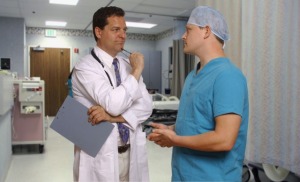by
Heather Mayer, DOTmed News Reporter | April 27, 2010

Physician self-referral
may be revisited
At the request of the American College of Radiology (ACR), representatives from the Committee on Energy & Commerce, Ways & Means Committee, and Ways & Means Subcommittee on Health called for the Government Accountability Office (GAO) to study the effects on Medicare spending of physician self-referral for advanced medical imaging and radiation therapy treatments.
There has been growing concern that physicians who purchase medical imaging and radiology equipment tend to order more tests to benefit financially from owning the technology.
The representatives, Henry Waxman (D-CA) from Energy & Commerce; Sandy Levin (D-MI) of Ways & Means; and Pete Stark (D-CA) from Ways & Means on Health, have requested in a letter to the GAO that the office specifically research the prevalence, patterns and trends in physician self-referral for advanced imaging and radiation oncology services; Medicare spending on these self-referred services; and to what degree self-referral may have contributed to increases in Medicare spending for these services.



Ad Statistics
Times Displayed: 79541
Times Visited: 2807 Ampronix, a Top Master Distributor for Sony Medical, provides Sales, Service & Exchanges for Sony Surgical Displays, Printers, & More. Rely on Us for Expert Support Tailored to Your Needs. Email info@ampronix.com or Call 949-273-8000 for Premier Pricing.
"There are also concerns that the potential financial incentives associated with self-referral could lead to the over-provision of imaging and radiology oncology services," they wrote. "Studies have suggested that physicians tend to be responsive to these financial incentives, and that self-referral may be a contributing factor in the rapid increase of use of these services."
The ACR wrote in a statement that the March 2009 Medicare Payment Advisory Commission (MedPAC) report to Congress found that overall Medicare imaging utilization growth for 2006 to 2008 was 2 percent or less in the United States. This number was equal to or below the growth rate of other "major" physician services.
But the report also found that the number of self-referred MRI and CT scans in the Medicare system, in addition to Medicare spending on MRI and CT, were almost double the rates performed by other providers.
"We want to make sure that incentives to do these tests are not influenced in any way by any of kind of financial bonus," Cindy Moran, ACR's assistant executive director of government relations and health policy, told DOTmed News.
The physician self-referral law "prohibits physicians from referring Medicare patients for imaging services, radiation therapy services...to an entity with which the physicians or a member of the physician's immediately family has a financial relationship."
However, the representatives point out the law's in-office ancillary exemption.
But the ACR argues that MRI, CT, PET and radiation therapy procedures are not ancillary services and they should be removed from the in-office ancillary exemption.
By removing these tests from the exemption, "you take the role of ownership out of the equation," Moran said, noting that only about 8 percent of physicians decide to invest millions of dollars into this type of equipment.
"This is not an issue that should alarm or necessarily cause concern for the average physician," she said.
The request to conduct research would have to be approved before the GAO study takes place.

